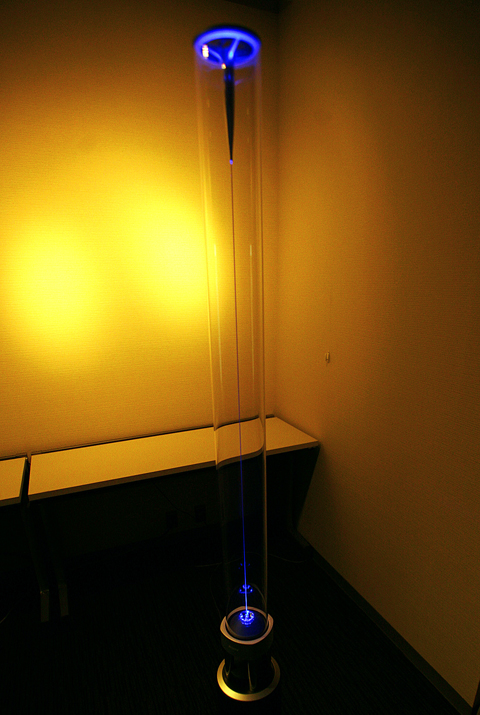Sony, the company that brought you the egg-shaped music player and the dog-like robot, has now created the transparent tube speaker.
Called Sountina — a combination of “sound” and “fountain” — the ¥1 million (US$9,600) acrylic speaker will go on sale on June 20 in Japan. Overseas sales are still undecided.
Sony Corp said the 1m long speaker produces high quality, natural-sounding audio that spreads 360 degrees all around from the tube and is able to fill hotel lobbies, wedding halls and other spacious areas.

PHOTO: AP
Sony officials did not give the exact distance the sound reaches, saying it varies depending on an area’s surfaces.
The tube, which measures 95mm in diameter, or slightly thicker than a baseball bat, vibrates to produce a clear, natural sound, they said.
The speaker, shown to reporters at Sony’s Tokyo headquarters yesterday, has light-emitting diodes (LED), in such colors as blue, amber, pink and purple at the bottom of the tube. The LEDs are reflected in the stainless steel at the top of the tube and if the room is dark enough, can also be seen reflecting off a steel string dangling inside the tube.
The colors don’t change automatically and must be set by hand using a remote controller.
Sony senior manager Noriyasu Kawaguchi said the Sountina is designed to deliver a soothing sound, but acknowledged some people may prefer more blast with heavier bass.
“Maybe it doesn’t work in the way some American consumers are expecting their speakers to work,” he said.
The Sountina is targeting a sophisticated niche consumer, including businesses seeking a speaker that blends into an interior, Kawaguchi said.

Nvidia Corp yesterday unveiled its new high-speed interconnect technology, NVLink Fusion, with Taiwanese application-specific IC (ASIC) designers Alchip Technologies Ltd (世芯) and MediaTek Inc (聯發科) among the first to adopt the technology to help build semi-custom artificial intelligence (AI) infrastructure for hyperscalers. Nvidia has opened its technology to outside users, as hyperscalers and cloud service providers are building their own cost-effective AI chips, or accelerators, used in AI servers by leveraging ASIC firms’ designing capabilities to reduce their dependence on Nvidia. Previously, NVLink technology was only available for Nvidia’s own AI platform. “NVLink Fusion opens Nvidia’s AI platform and rich ecosystem for

‘WORLD’S LOSS’: Taiwan’s exclusion robs the world of the benefits it could get from one of the foremost practitioners of disease prevention and public health, Minister Chiu said Taiwan should be allowed to join the World Health Assembly (WHA) as an irreplaceable contributor to global health and disease prevention efforts, Minister of Foreign Affairs Lin Chia-lung (林佳龍) said yesterday. He made the comment at a news conference in Taipei, hours before a Taiwanese delegation was to depart for Geneva, Switzerland, seeking to meet with foreign representatives for a bilateral meeting on the sidelines of the WHA, the WHO’s annual decisionmaking meeting, which would be held from Monday next week to May 27. As of yesterday, Taiwan had yet to receive an invitation. Taiwan has much to offer to the international community’s

ALL TOGETHER: Only by including Taiwan can the WHA fully exemplify its commitment to ‘One World for Health,’ the representative offices of eight nations in Taiwan said The representative offices in Taiwan of eight nations yesterday issued a joint statement reiterating their support for Taiwan’s meaningful engagement with the WHO and for Taipei’s participation as an observer at the World Health Assembly (WHA). The joint statement came as Taiwan has not received an invitation to this year’s WHA, which started yesterday and runs until Tuesday next week. This year’s meeting of the decisionmaking body of the WHO in Geneva, Switzerland, would be the ninth consecutive year Taiwan has been excluded. The eight offices, which reaffirmed their support for Taiwan, are the British Office Taipei, the Australian Office Taipei, the

CAUSE AND EFFECT: China’s policies prompted the US to increase its presence in the Indo-Pacific, and Beijing should consider if this outcome is in its best interests, Lai said China has been escalating its military and political pressure on Taiwan for many years, but should reflect on this strategy and think about what is really in its best interest, President William Lai (賴清德) said. Lai made the remark in a YouTube interview with Mindi World News that was broadcast on Saturday, ahead of the first anniversary of his presidential inauguration tomorrow. The US has clearly stated that China is its biggest challenge and threat, with US President Donald Trump and US Secretary of Defense Pete Hegseth repeatedly saying that the US should increase its forces in the Indo-Pacific region